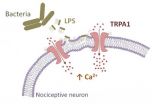(Press-News.org) Austin – February 10, 2014 – Going on a double date may be more effective at reigniting passion in your own relationship than the classic candlelit dinner for two. According to new research, striking up a friendship with another couple in which you discuss personal details of your life will bring you closer to your own partner.
"Passionate love is one of the first dimensions of love to decrease in couples over time as the newness of a relationship begins to wane," says Keith Welker, a doctoral student at Wayne State University. "Relationships have widely been thought to flourish and develop in a broader network of social relationships, while emerging research has suggested that novel, arousing experiences can increase feelings of passionate love."
The new research fuses together the two research areas, showing that novel, high-self-disclosure interactions with other couples can increase feelings of passionate love. Such interactions, the researchers say, may cause us to perceive our partners and the relationship in a new light.
Indeed, perception is vital in a relationship, according to a range of new studies to be presented this week at the Society for Personality and Social Psychology (SPSP) annual conference in Austin. Whether we perceive a long-term commitment as marriage versus merely cohabitating can change how we respond to stress, according to one study, while our perceptions of how much our partner truly wants the best for us predicts psychological health over 10 years in another study.
Double dates to reignite passionate love
Welker, with his adviser Rich Slatcher, had previously studied how self-disclosure increased closeness within couples. They wanted to extend the research to investigate how self-disclosure between couples affects closeness and feelings of passionate love.
"We were expecting that the formation of a friendship between two couples in the lab would increase closeness and relationship satisfaction," Welker says. "However, we found the robustness of the effects on passionate love surprising."
In two studies with about 150 couples, the researchers used the "Fast Friends" activity, originally developed by Arthur Aron of Stony Brook University, a co-author on the new study. Over 45 minutes, couples answered basic "get-to-know-you" questions, such as "What is your idea of a perfect day?" or "Given the choice of anyone in the world, whom would you want as a dinner guest?" The questions progressed to much deeper, personal topics such as "What was the most embarrassing moment in your life?" or asking for advice on personal problems. "This task has been repeatedly shown to make both strangers and friends closer to each other," Welker says.
In one of the studies, couples who met each other through the high-disclosure Fast Friends activity reported higher feelings of passionate love than those assigned to a low-disclosure task, which involved non-emotional, small-talk questions. In a second study, the researchers found that how responsive another couple was to personal disclosure predicted the increase in passionate love following the Fast Friends task.
"The more that the other couple responds to your self-disclosures in a validating and caring way when on a double date, the more passionate you feel about your own relationship," Welker explains. "Although we still need to investigate why responsiveness from other couples predicts increases in passionate love, one possibility is that having another couple respond positively to yourself and your partner may provide you with a fresh, positive view of your partner and relationship."
In the meantime, this Valentine's Day, Welker suggests picking a double-date activity that facilitates personal disclosure. "Any setting where couples can talk, exchange information about each other, and respond to each other in a validating, thoughtful manner could apply," he says. "One very practical application could be going out to dinner with another couple." But he says to opt for dinner at home, as that will engender more disclosure than a date at a public restaurant.
Marriage signals in the brain
How you view your partner and the commitment level of your relationship significantly affects your health. Researchers have found that being married confers health benefits above mere cohabitation but it may just all be in our heads. It turns out that merely regarding your relationship as a marriage can confer the same benefits, even if you haven't actually tied the knot.
Over the past 20 years of studying relationships, including how couples regulate each others' emotions, Jim Coan of the University of Virginia became interested in the "cohabitation effect" – the idea that cohabiting couples, compared to married couples, are less stable, show fewer health-related benefits, and may even be more likely to divorce if they ultimately marry. "I've always felt personally skeptical of these findings, not really for any strong empirical reason, they just felt intuitively wrong to me," he says.
So Coan set out to explore the effect by comparing how married couples, cohabiting couples, dating couples, and friends handle stress together. He specifically looked at how holding hands during a potential threat can decrease activity in the hypothalamus – a potential neurophysiological marker for the effect of stress on health. The work builds on past evidence that hand-holding helps people regulate their emotions. "Hand-holding is special," Coan says. "It has special symbolic value over and above, say, holding an elbow or an ankle."
Using fMRI, Coan and colleagues collected brain activity from 54 couples — half of whom were married, the other half cohabiting — as they viewed "threat" or "safe" cues in the scanner. Threat cues signaled to subjects that they faced a 20 percent chance of electric shock to their ankle, while the safe cues signaled a 0 percent chance of shock. Some of the time, subjects held the hand of their partner, while other times, they either held the hand of a stranger or faced the cues alone.
Married couples, but not cohabitating couples, had reduced hypothalamic activity in response to threat cues while holding hands with their partners. "The most surprising thing about this is that our cohabiting couples are matched for age, relationship duration, and relationship satisfaction," Coan says. "So why should they respond so differently to supportive hand-holding?"
The answer, he thinks, lies in data he collected with same-sex couples. Coan conducted a parallel study with 26 same-sex couples, none of whom were legally married but half of whom described their relationship as a marriage. They found the same difference in hypothalamic regulation by hand-holding between self-described married and self-described cohabiting same-sex couples. "So whatever the ultimate explanation, I do not think the phenomenon is real," Coan says. "I think it has to do with the conceptualization of one's relationship."
"It may not even be about marriage, per se, but about asserting cohabitation instead," he explains. "Asserting cohabitation is basically asserting that one is not 'locked in' to a commitment."
Marriage is a signal, Coan says, that is intended to convey dependability and predictability. "So I think the take-home implication is that our brains are sensitive to signs that the people we depend on in our lives are predictable and reliable," he says. "And our brains will depend upon — will, in effect, outsource to — those we feel are most predictable and reliable for our emotion-regulation needs."
Health benefits from perceived support
Another big factor in how relationships affect our health is how much we believe our partners care for, understand, and appreciate us. This factor predicts everything from personal growth to emotional stability — above and beyond initial well-being — according to a new longitudinal study.
"The effect of relationships on our psychological and physical health is much stronger than any other factor you can think of," says Emre Selcuk of Middle East Technical University in Turkey. "For instance, the effect of the existence and quality of close relationships on mortality is larger than that of cigarette smoking."
Selcuk and Anthony Ong have been trying to figure out which unique aspects of relationships contribute to this effect. Specifically, they are interested in "perceived partner responsiveness" – the extent to which you think your partner genuinely wants the best for you. This perceived support is distinct from how much support you actually receive from your partner.
Past research has shown the more partner support someone receives, the more at risk that person is for all-cause mortality. However, work by Selcuk and Ong demonstrated that this effect disappeared completely for individuals who perceive their partner as responsive to their needs. Moreover, the new longitudinal study, analyzing a national U.S. sample of more than a 1,000 married or cohabiting people surveyed in 1995/6 and then again in 2005/6, shows that the more perceived support, the better our psychological well-being 10 years later.
These findings come down to perception: "The effectiveness of received support depends on the perceptions of the recipient rather than the amount of actual support enacted," Selcuk says. If you do not perceive your partner as responsive to your needs, "even the best-intentioned support behavior may backfire and lead to worse outcomes," he says. "But if you perceive your partner as really caring for, understanding, and appreciating you, then your romantic relationship will make you a happier and healthier person in the long-term."
The research follows past work by Selcuk and colleagues showing that just a reminder of a responsive romantic partner – such as viewing a photo of your partner – helps someone cope with emotions induced from recalling an upsetting past event. Those who benefited the most from viewing their partner's photograph experienced fewer psychological and physical health problems in their life even weeks after the experiment. The latest analysis found that people who perceived their partner as responsive experienced higher life satisfaction and purpose in life, and lower depression, among other positive psychological attributes, 10 years later.
"Our findings clearly show that having someone in our life whom we perceive as genuinely caring for us, understanding and appreciating our needs, concerns, and goals enhances our ability to recover from negative emotions, improves our psychological well-being, confers protective health benefits, and even affects the very length of our life," Selcuk says. "So anyone who has not chosen their partner yet should do it very wisely because it may very well turn out to be the most important decision they will ever make."
INFORMATION:
Welker, Coan, and Selcuk are presenting their research at the SPSP annual conference in Austin, Feb. 13-15, 2014. More than 3,500 scientists are in attendance at the conference in Austin. Follow the meeting on Twitter: #SPSP2014, @SPSPnews.
Read our new blog spspblog.org, #SPSPblog for coverage of the conference and news and perspectives on personality and social psychology.
SPSP promotes scientific research that explores how people think, behave, feel, and interact. With more than 6,000 members, the Society is the largest organization of social and personality psychologists in the world.
Keep romance alive with double dates
And other ways perceptions influence relationships
2014-02-10
ELSE PRESS RELEASES FROM THIS DATE:
Study suggests ways to improve common furniture fire test
2014-02-10
The bench-scale test widely used to evaluate whether a burning cigarette will ignite upholstered furniture may underestimate the tendency of component materials to smolder when these materials are used in sofas and chairs supported by springs or cloth, National Institute of Standards and Technology (NIST) and American University researchers report in a new study.*
The study comes as regulations and methods for evaluating the likelihood that soft-furniture materials will ignite are undergoing scrutiny. In November 2013, California removed an open-flame test from its furniture ...
New pain target for bacterial infections
2014-02-10
Components in the outer wall of bacteria directly activate pain sensors, triggering immediate pain and inflammatory responses. This finding by a multinational team of researchers led by Professor Karel Talavera (KU Leuven, Belgium) and Professor Félix Viana (Institute of Neuroscience, Spain) sheds new light on pain associated with bacterial infections and reveals a new target for drugs designed to treat them.
Bacterial infections are a global health problem and their treatment remains a major challenge to modern medicine. Infections of Gram-negative bacteria, in particular, ...
Mechanism elucidated: How smell perception influences food intake
2014-02-10
In animals, as in humans, hunger mechanisms are known to stimulate food intake. Hunger triggers a set of mechanisms that encourage feeding, for example by increasing sensory perceptions such as the sense of smell. The researchers have now succeeded in revealing what links hunger and increased smell perception in the brain, and the resulting urge to eat.
The researchers have discovered how this mechanism is initiated in the endocannabinoid system in mice. This system interconnects receptors located in the brain and involved in different sensations such as euphoria, anxiety, ...
University clinical pharmacologist researching chronic lead intoxication in goats
2014-02-10
MANHATTAN, Kan. -- The Nile is a river in Egypt. Sometimes that river is polluted with industrial waste, such as lead, which can cause detrimental effects on local sheep and goats via the water supply.
Kansas State University's Ronette Gehring is an associate professor of clinical pharmacology in the of anatomy and physiology department of the university's College of Veterinary Medicine. She has joined a team of researchers from Egypt, Jordan and the United States in evaluating the effect of chronic lead intoxication in goats. In December 2013, the researchers published ...
Report calls for abolition of fixed retirement age
2014-02-10
A report led by a professor at the University of Southampton recommends the worldwide removal of the fixed or default retirement age (DRA).
Professor Yehuda Baruch from the Southampton Management School, in collaboration with Dr Susan Sayce from the University of East Anglia and Professor Andros Gregoriou from the University of Hull, has found that, on a global scale, current pension systems are unsustainable.
Professor Baruch comments: "We have a global problem with funding pensions, which assume people will retire around their mid-60s. Young people are tending to ...
Study finds 3-fold increase in pregnancy among young girls with mental illness
2014-02-10
TORONTO, February 10, 2014 – Young girls with mental illness are three times more likely to become teenage parents than those without a major mental illness, according to a first-of-its-kind study by researchers at the Institute for Clinical Evaluative Sciences (ICES) and Women's College Hospital.
The study, published today in the journal Pediatrics, is the first to examine trends in fertility rates among girls with mental illness.
"Research tells us that young girls are at high risk of pregnancy complications, including preterm birth, poor fetal growth and postpartum ...
Drifting herbicides produce uncertain effects
2014-02-10
Farmers should take extra precautions so drifting herbicides do not create unintended consequences on neighboring fields and farms, according to agricultural researchers.
The researchers found a range of effects -- positive, neutral and negative -- when they sprayed the herbicide dicamba on old fields -- ones that are no longer used for cultivation -- and on field edges, according to J. Franklin Egan, research ecologist, USDA-Agricultural Research Service. He said the effects should be similar for a related compound, 2,4-D.
"The general consensus is that the effects ...
Young, unvaccinated adults account for severest flu cases
2014-02-10
DURHAM, N.C. – A snapshot of patients who required care at Duke University Hospital during this year's flu season shows that those who had not been vaccinated had severe cases and needed the most intensive treatment.
In an analysis of the first 55 patients treated for flu at the academic medical center from November 2013 through Jan. 8, 2014, Duke Medicine researchers found that only two of the 22 patients who required intensive care had been vaccinated prior to getting sick.
The findings were published online in Monday, Feb. 10, 2014, in the American Journal of Respiratory ...
Researchers discover immune signature that predicts poor outcome in influenza patients
2014-02-10
(Memphis, Tenn. – February 10, 2014) St. Jude Children's Research Hospital scientists have identified a signature immune response that might help doctors identify which newly diagnosed influenza patients are most likely to develop severe symptoms and suffer poor outcomes. The findings also help explain why infants and toddlers are at elevated risk for flu complications. The research appears in the upcoming issue of the American Journal of Respiratory and Critical Care Medicine.
The discovery came after investigators tracked flu infections for 28 days in 84 individuals ...
How do polar bears stay warm? Research finds an answer in their genes
2014-02-10
BUFFALO, N.Y. — In the winter, brown and black bears go into hibernation to conserve energy and keep warm.
But things are different for their Arctic relative, the polar bear. Within this high-latitude species, only pregnant females den up for the colder months.
So how do the rest survive the extreme Arctic winters?
New research points to one potential answer: genetic adaptations related to the production of nitric oxide, a compound that cells use to help convert nutrients from food into energy or heat.
In a new study, a team led by the University at Buffalo reports ...
LAST 30 PRESS RELEASES:
Researchers develop new strategy for improving inverted perovskite solar cells
Yes! The role of YAP and CTGF as potential therapeutic targets for preventing severe liver disease
Pancreatic cancer may begin hiding from the immune system earlier than we thought
Robotic wing inspired by nature delivers leap in underwater stability
A clinical reveals that aniridia causes a progressive loss of corneal sensitivity
Fossil amber reveals the secret lives of Cretaceous ants
Predicting extreme rainfall through novel spatial modeling
The Lancet: First-ever in-utero stem cell therapy for fetal spina bifida repair is safe, study finds
Nanoplastics can interact with Salmonella to affect food safety, study shows
Eric Moore, M.D., elected to Mayo Clinic Board of Trustees
NYU named “research powerhouse” in new analysis
New polymer materials may offer breakthrough solution for hard-to-remove PFAS in water
Biochar can either curb or boost greenhouse gas emissions depending on soil conditions, new study finds
Nanobiochar emerges as a next generation solution for cleaner water, healthier soils, and resilient ecosystems
Study finds more parents saying ‘No’ to vitamin K, putting babies’ brains at risk
Scientists develop new gut health measure that tracks disease
Rice gene discovery could cut fertiliser use while protecting yields
Jumping ‘DNA parasites’ linked to early stages of tumour formation
Ultra-sensitive CAR T cells provide potential strategy to treat solid tumors
Early Neanderthal-Human interbreeding was strongly sex biased
North American bird declines are widespread and accelerating in agricultural hotspots
Researchers recommend strategies for improved genetic privacy legislation
How birds achieve sweet success
More sensitive cell therapy may be a HIT against solid cancers
Scientists map how aging reshapes cells across the entire mammalian body
Hotspots of accelerated bird decline linked to agricultural activity
How ancient attraction shaped the human genome
NJIT faculty named Senior Members of the National Academy of Inventors
App aids substance use recovery in vulnerable populations
College students nationwide received lifesaving education on sudden cardiac death
[Press-News.org] Keep romance alive with double datesAnd other ways perceptions influence relationships





